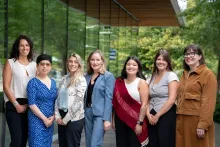
A new workshop on decreasing substance use stigma through improved team-based communication and patient-centered care was delivered to students as part of the UBC Health Integrated Curriculum last month.
Nearly 400 students from audiology, dentistry, dietetics, genetic counselling, pharmacy, and speech-language pathology participated in the workshop.
The workshop was developed collaboratively by subject matter experts from the BC Centre on Substance Use (BCCSU), people with lived and living experience, substance use clinicians, and faculty from participating health programs. The session was built around a video simulation developed by the Regional Addiction Program at Vancouver Coastal Health.
Thank you for bringing more awareness towards substance use stigma. I wish more healthcare professionals in our province could receive this training on a consistent basis.
The video was the basis for small group discussions on appropriate interprofessional communication while caring for people who use substances and how to decrease substance use stigma when working with members of the team, including the patient. Students also reflected on their personal views and values about substances and substance use and how these might impact interactions with patients and the interprofessional team.
“Given the ongoing public health emergency in BC due to toxic drug poisonings and the reality that people who use substances will interact with healthcare providers across the system of care, the workshop provided valuable, highly relevant interprofessional learning in a complex area of health,” says Christina Chant, Director, Education and Clinical Activities, BCCSU.
I learned how to decrease substance use stigma when communicating with the patient, colleagues, and other interprofessional team members.
The workshop also provided students with an opportunity to develop some of the skills and knowledge articulated in the Canadian Interprofessional Health Collaborative’s National Interprofessional Competency Framework, such as patient-centered care, interprofessional communication, collaborative leadership and shared decision-making, and interprofessional conflict resolution.
Results from the post-workshop evaluation showed that more than 90% of students felt that the workshop was valuable to their learning. Students made the following comments in the evaluation:
- Thank you for bringing more awareness towards substance use stigma. I wish more healthcare professionals in our province could receive this training on a consistent basis.
- I really enjoyed this workshop! It was very engaging and I learned a lot - my favourite UBC Health workshop I’ve done so far this semester.
- I learned how to decrease substance use stigma when communicating with the patient, colleagues, and other interprofessional team members.
- Providing patient-centered care is vital to providing a healthcare environment that welcomes individuals to access it when needed, and not be scared of accessing it due to stigma/prejudice from healthcare workers.
- The language we use plays a big role in decreasing stigma around substance use. Using stigmatizing language can discourage individuals who use substances from seeking support.
For information on available resources, visit the Substance Use and Addiction Education page.
Posted December 14, 2022



